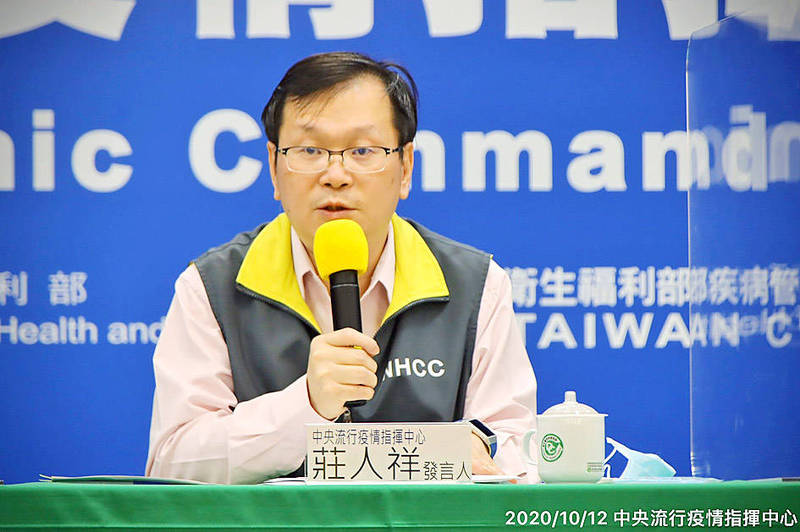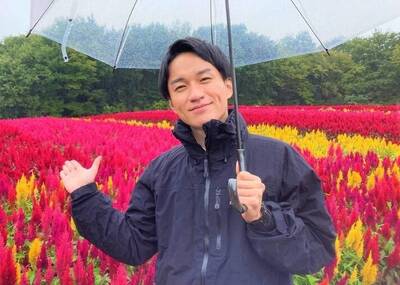《TAIPEI TIMES》 Spaniard found dead in quarantine apartment

Centers for Disease Control Deputy Director-General Chuang Jen-hsiang speaks at a news conference in Taipei on Monday. Photo courtesy of the Central Epidemic Command Center
SUICIDE MOTIVE PROBED: The 50-year-old woman had a boyfriend in Taiwan and police entering her apartment found no signs of forced entry, but they did find charcoal
By Lee I-chia and Kayleigh Madjar / Staff reporter, with staff writer
Taipei police yesterday found a Spanish woman dead in her COVID-19 quarantine accommodations, although the cause of death is yet to be determined.
The 50-year-old entered Taiwan on Oct. 2 and was due to leave quarantine today, police said.
After officials failed to contact her yesterday morning, officers were dispatched to the apartment on Chengdu Road in Wanhua District (萬華) at 4pm, they said.
Officers wearing full protective gear entered the apartment, where they found charcoal, but no signs of forced entry, they added.
Police said they were investigating a possible motive for suicide, as there was no note at the scene.
The woman had not reported any COVID-19 symptoms and regularly received deliveries from her boyfriend, they said.
The Taipei Department of Civil Affairs said that due to the language barrier, managing foreigners in quarantine falls to the local police force, which in this case was the Wanhua precinct.
Centers for Disease Control Deputy Director-General Chuang Jen-hsiang (莊人祥), the Central Epidemic Command Center’s (CECC) spokesman, told reporters that the CECC would proceed after hearing from investigators and forensic doctors.
Separately, the CECC said that three people tested positive for COVID-19 after arriving in Japan from Taiwan last week.
Minister of Health and Welfare Chen Shih-chung (陳時中), who heads the CECC, said that it has received a report that three Japanese — a woman and two men aged between 40 and 70 — tested positive for COVID-19 after arriving from Taiwan.
One of them is a permanent resident of Taiwan, but often travels between the two countries, and last entered the nation on Sept. 3, the CECC said.
The other two entered Taiwan on July 23 and Aug. 25 to visit family and for work, and all three left last week, it added.
They tested positive in antigen tests upon arrival in Japan, the CECC said, adding that they are all asymptomatic.
One was released from isolation after testing negative in two consecutive polymerase chain reaction (PCR) tests on Monday and Tuesday, while another tested negative in a PCR test on Tuesday, the CECC said.
Fifteen among 16 close contacts of the three cases in Taiwan have tested negative in PCR and antibody tests, while one person was being tested yesterday, it said.
Ten travelers from Taiwan to Japan have so far tested positive for COVID-19, eight of whom tested positive upon arrival, but tested negative in a second examination, Chen said, adding that there was no follow-up information on the other two cases.
“We suspect there might be some errors in the antigen tests, as the travelers all tested negative in a PCR test within a week afterward,” he said, adding that all their close contacts in Taiwan tested negative in PCR and antibody tests, so the CECC’s preliminary judgement is that the eight cases might be false positives.
As of Tuesday, 46 travelers from Taiwan had tested positive for COVID-19 in other countries and 2,183 close contacts were identified in Taiwan.
Of those, 1,109 people required testing and 1,108 have tested negative in both PCR and an antibody tests, the CECC said.
Chen said the CECC humbly accepts the reported cases and remains cautious by thoroughly conducting contact tracing and testing, but if people accused Taiwan’s disease prevention of having fatal flaws because of the cases, they would be exaggerating.
In related news, the government yesterday stopped requisitioning all the of the medical-grade masks produced in the nation, the CECC said.
The government on Sept. 24 began requisitioning the masks for its rationing system.
Chen yesterday said as the number of requisitioned masks is enough for the rationing system and backup storage, the full requisition policy would end earlier than scheduled, returning to partial requisition.
Manufacturers can sell the extra masks on the market, he added.
Additional reporting by Wang Kuan-jen and Tsai Ssu-pei
新聞來源:TAIPEI TIMES



















